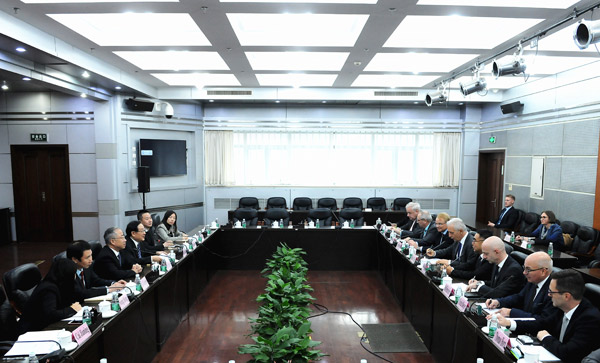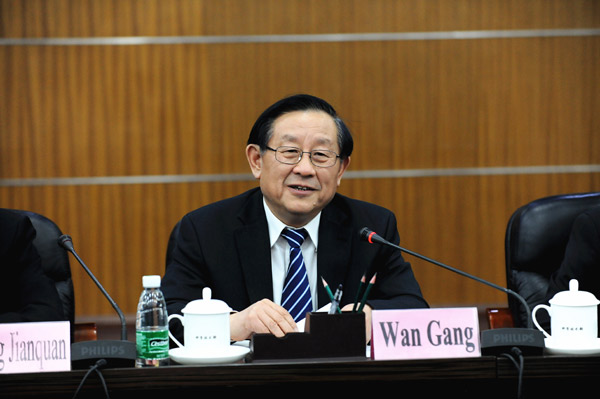
On November 20, 2017, Minister of Science and Technology Wan Gang met with the German delegation headed by Governor Stanislaw Tillich of Saxony. The two sides exchanged in-depth views and reached consensuses on further promoting cooperation in electric vehicles and lightweight manufacturing and between universities, especially in expanding cooperation in life sciences, health, environmental protection, artificial intelligence (AI) and youth innovation and entrepreneurship.
Minister Wan Gang briefed the guests on the latest development of science and technology innovation (STI) in China. The 19th National Congress of the Communist Party of China (CPC) stressed the need to unswervingly implement a new philosophy of innovative, coordinated, green, open and shared development, and innovation will be put at the central place of China’s national development as the primary driving force. Based on their comprehensive strategic partnership, China and Germany should seize the opportunities of the new era and work together to cope with major global challenges and promote the building of an innovative world economy. Minister Wan Gang appreciated the outstanding achievements Saxony has accomplished in innovation and development in recent years and spoke highly of the contributions Saxony has made in pushing forward China-Germany STI cooperation. The Lightweight Research and Development Center established by CRRC and Dresden University of Technology has not only spawned a number of outstanding research and development results and promoted exchanges between outstanding scientists, but also expanded cooperation to other fields such as electric vehicles, injecting new impetus into bilateral cooperation between the research and industry circles of the two countries. Minister Wan Gang said that 2018 marks the 40th anniversary of the signing of the China-Germany Intergovernmental Agreement on Science and Technology Cooperation, and events including the Fifth China-Germany Innovation Conference will be held. He welcomed the participation of the government, industry, universities and research circles in Saxony. He also suggested that the two sides engage in high-level cooperation in the fields of life sciences, health, environmental protection, AI and youth innovation and entrepreneurship, in relation to the new situation and new demand of the policy environment, technological advantages and market prospects in the two countries.

Governor Tillich agreed with Minister Wan Gang’s view and said that Saxony has always attached importance to STI cooperation with China and would like to see a series of achievements made by the two sides in their cooperation on electric vehicles and lightweight manufacturing. Governor Tillich said that in addition to attracting multinational companies such as Intel, Volkswagen, BMW to make localized R&D, Saxony has also accomplished various innovative results in biomedicine, health and advanced materials and planned to cooperate with localities like Hubei and Guangdong in China within the friendly province-state framework in the areas of intelligent logistics and advanced manufacturing. Governor Tillich thanked Minister Wan Gang for his briefing on the new policies and new situation of STI development in China and he would use the opportunity to further strengthen bilateral cooperation.
Present at the meeting were Vice President Liang Jianquan of the Chinese People’s Institute of Foreign Affairs, Deputy Director-General Cai Jianing of International Cooperation and Deputy Director-General Cao Guoying of High-Tech Development and Industrialization of the Ministry of Science and Technology (MOST).

